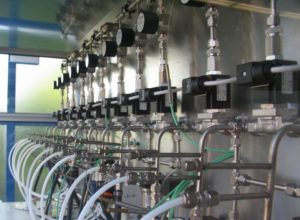Components and Fuels Undergoing Testing

OWI develops testing-benches for tests of interdependencies of fuels and vehicle components. Photo: OWI
OWI Science for Fuels develops testing methods and apparatuses which allow for the determination of the physical-chemical characteristics of liquid fossil and regenerative fuels. Due to the admixture of regenerative fuels, their application-specific characteristics usually change. By means of the development and use of special testing-benches the acting mechanisms of different fuel blends can be tested for technical components in the vehicle technology as well as in heating systems in the domestic heating market.
In testing-benches at OWI, technical components from subsystems of motor vehicles (e.g. in-tank pumps or pre-heating) or heating systems (e.g. burner or fuel pumps) are integrated true to the system. The fuel is led in a loop via the sub- or total system that is taken into consideration. This allows for identifying the point of time, the type and extent of, for instance, the deposit formation or possible system failures. Even with adherence to all fuel standardisations, individual failures or system failures can occur.
Therefore, testing-benches are used in individual cases, e.g. for the testing of fuels which have caused problems in this field. The aim is to analyse the causes of the problems and develop a problem-solving approach. Besides, widespread fundamental research is carried out at the testing-benches, e.g. to analyse aging processes of fuels which have an effect on their storage stability.
The advantages of the development of analysis methods at testing-benches are time- and cost-saving. The experiment runtime can be reduced to up to 1.000 hours and is thus acceptable even for industrial purposes. Moreover, total systems must not be built up to carry out tests for components. As a result, testing methods become considerably more cost-efficient. Furthermore, fuels can be led in a loop at the testing-bech, which requires a lower amount of test fuel. HiL-testing-benches were developed and used, for instance, in the following projects:
ATES FAME (DGMK 729)
GObio
ENIAK
Entwicklung einer Screening-Prüfmethode für Schmierfette
